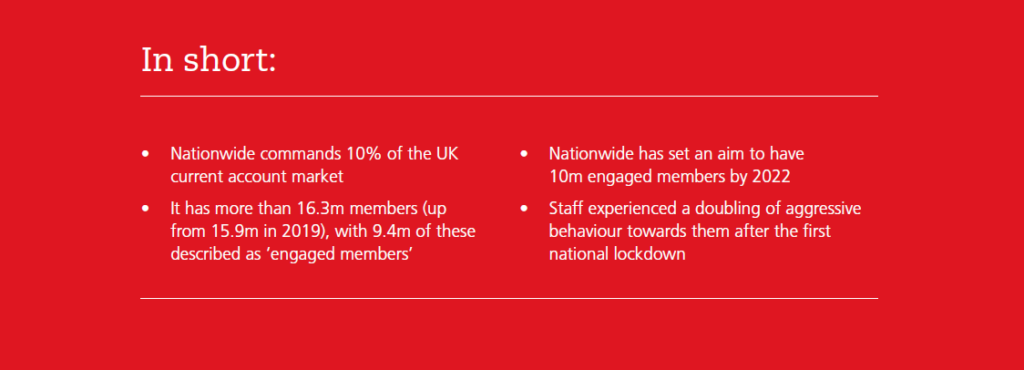Extract from Customer Focus Magazine: Issue 32 (May 2021)
Joe Garner, chief executive of Nationwide Building Society, doesn’t just want to provide great service; for him, nothing short of being ‘legendary’ will do.
Few organisations can honestly, and wholeheartedly, say they are genuinely building better futures. Nationwide Building Society – the clue is in its name – is unarguably one of these rarities. It’s the mutual that was instrumental in building Letchworth – the first of Britain’s ‘Garden Cities’ – and having grown to be the world’s largest building society (with more than 16m members), its careful management of more than £250 billion in assets means it continues to build homes and support people’s lives today.
It is currently overseeing the construction of 239 houses near its Swindon HQ (30% of which will be affordable housing), and this is on top of its numerous other altruistic activities. These include creating a £22m fund to give to community projects in the next five years, and the creation of the Nationwide Foundation, which has so far distributed more than £38m to 3,000+ charities. With a 10% share of UK current accounts, a thriving mortgage providing service, plus many traditional financial services products, sometimes people regard it as their ‘bank’ – but it’s a word its CEO Joe Garner definitely prefers not to use.
“Our roots are firmly linked to the cooperative movement of the 1840s, which is that we exist for a social purpose,” he says emphatically. “So when people talk about ‘banking’ and their expectations about service around banking-related products we don’t really use that phrase, or want to compare ourselves to other banks, at all. It’s just not who we are,” he explains. “Our customers are really our ‘members’ – that’s the preferred term we use – and it’s they who vote on whether I keep my job each year! I think it instils a certain type of customer mindset: that members are ‘owners’ too.”
The upshot, argues Garner, is that while there are lots of universal service standards members expect (what he calls “ever-more speed, ease and certainty”), he argues the foundation of the business creates unique challenges. “If anything, because of the philanthropic outlook of the members we attract, they almost expect even greater levels of service,” he says. “This is that we remain true to our promise from way-back, but also deliver on what they want now and in the future,” he adds.
So how does an organisation respond to this, and satisfy such heightened service expectations? With perhaps the loftiest of aspirations. Garner is a man that doesn’t do things by half. Rather than saying he wants ‘great service’ (or even ‘excellent’ service for that matter), he’s upping the ante even further. It’s ‘legendary service’, that he covets – and so much so, the phrase is now officially written into Nationwide’s main ‘pillars’ (ones which he redefined when first taking over the CEO reigns in 2016).
“Legendary service runs alongside our other principles of built to last; building pride; building a thriving membership and building a national treasure,” he says. And he is unapologetically determined to succeed with this. “Being legendary is a high ambition,” he concedes, “but we instinctively believe in it, and our continued ability to demonstrate it.”
“Our customer are really our ‘members’ – that’s the preferred term we use.”
Despite the grand ambitions, Garner is more than aware of the scale of the challenge. The former head of HSBC in the UK (where he was widely credited for implementing the ‘Treating Customers Fairly’ initiative), clearly knows what they need to do to achieve it. The central plank is, he elaborates, staying resolutely an organisation with a ‘human touch’. And this means specifically maintaining a commitment to preserve its branch network.
Some of this relates back to a momentous decision he first made in 2019. At a time when high streets up and down the country were losing an average of 55 branches a month, Garner bravely announced his alternative approach – his ‘Our Branch Promise’. It was a pledge ‘not to leave any town or city in which we are currently based without a branch for at least two years’. The promise outlined that towns or cities with a branch on 18 March would still have a branch until at least 31 May 2021. Obviously, this was a pre-pandemic initiative, but while other financial institutions have continued wielding their scythes, Garner says it’s now even more important this promise is kept. In fact, he’s just announced the pledge will stay until at least 2023.
“Digital will accelerate, that’s not going to change,” he says. “But we don’t see the future as entirely digital, and we think personal attention is particularly important when offering complex financial services, like mortgages.”
A commitment of this nature is a courageous one, not least because any branch closure remains a sensitive issue. The Society does still need to close branches – those where it doesn’t contravene the pledge but are necessary due to low usage or to integrate into better premises. But as Garner defends, he’s pretty much been able to stick to his guns: “Look at the entire British banking sector, and you’ll see that the number of branches has fallen by 29% since 2015. By comparison, we’ve closed just 4% of branches.”
Being a mutual does, he feels, help him stick to these sorts of ambitions. “We only have employees and members to answer to – so that’s a big advantage,” he says. “But we do also need to make money, to make good on our pledge to do good work, so there’s obviously a balancing act.” But it’s a tightrope he walks where he tries to show leadership. During the first wave of the COVID-19 pandemic he was amongst the first CEOs to take a pay cut. “It wasn’t designed as a public thing at all,” he recalls of the gesture. “It was more I could see that many of our members were suffering financial hardships, and it just felt the right, and appropriate thing to do.”
“We only have employees and members to answer to – so that’s a big advantage”
But if service is required to be ‘legendary’, how exactly will he know this? In financial services in particular, there is no shortage of indices he and his fellow CEO peers can pour over to try and gauge the best approach. In many of them, Nationwide excels – such as Which?’s annual mortgage lenders survey – where it was one of just three providers in 2020 awarded Recommended Provider status, based on customer service feedback received.
Nationwide aims to be best for customer satisfaction in its peer group and to lead it by 4%, and currently it leads by 5.4% (up from 4.8% in 2019). But despite this, and as well as winning ‘Which? Best Banking Brand’ in 2017, 18, 19 and 20, Garner already says he doesn’t consider comparing himself against other mainstream banks as comparing apples with apples. Instead, he says the two service indices he values the most are The Institute’s own UKCSI score and research by the Financial Research Survey (conducted by Ipsos MORI). The latter also looks at the extent to which brands benefit by customers switching and finds Nationwide scoops up 1 in 6 of all current account switchers.
But these are at most bi-annual surveys, and so Garner says he also makes a priority of looking at – almost by the hour – a social media feed that shows him real, live customer feedback, aggregated from different digital channels. “As of 11.13am today, we’re at 162 pieces of unprompted customer feedback,” he says proudly. “We’ve gauged from this a 77.8% customer service score.”
The comments he reads seem to give him genuine delight. “This one’s from earlier,” he reads excitedly. “Received at 8.47am – a comment from Facebook. It reads: ‘I just want to thank the three ladies at Nationwide, Didcott. Even during this horrible pandemic they have made me smile and have given such good service and with such a professional vibe.’” Garner pauses for a moment as if to let this sink in. “When you read stuff like this, you realise this is what we want to be all about,” he summarises. “I will personally send these colleagues a ‘Pride Card’ – which is what we give all staff when we receive feedback like this.”
Such obsessive service will surely put this particular building society on a very good footing indeed for achieving its stated legendary service aim. Sure, it’s suffered some technical issues in the past – for example, a glitch left some customers unable to pay their bills, while another saw people charged twice for credit card bills – but few digitally transforming financial services firms have avoided these sorts of hiccups from time to time. And when they do happen, Nationwide tries to go the extra mile to apologise and put things right. For example, when it recently sent incorrect text warnings to members who were going into an unarranged overdraft, it quickly moved to refund any fees. As part of a wider review of overdrafts, the Society also announced it would remove unarranged overdraft fees entirely in November 2019.
“In everything we do, we try to be better [than the competition],” explains Garner. “It flows through into directly how we structure our employees’ pay,” he adds – wanting to specifically mention this. “No one here is on any short-term incentive plan – the sort that could see advisors pushing products to people that don’t really want them.” He says: “Everyone’s reward is linked to our service levels, and I really believe this creates the sort of service behaviours our members and customers expect.” He adds: “I don’t think there’s enough attention given to the way people are organised and the service this creates. But we absolutely see the link.”
“In everything we do, we try to be better than the competition”
Commitment to staff comes in other guises too. Last August, the building society called on its own customers to respect its staff with the launch of the #TogetherAgainstHate campaign. It was devised after the mutual said employees had experienced a doubling in the amount of rude and aggressive behaviour aimed at them in the aftermath of the first national lockdown, and when further regional restrictions ensued. In one extreme case, a woman ran around the branch deliberately trying to breathe on people. The initiative chimes with The Institute’s Service with Respect campaign which the building society has also thrown its support behind.
The January 2021 UKCSI revealed the highest-rated organisations for customer satisfaction, and this included a top 15 place for Nationwide suggesting the work Garner is putting into instilling an always improving service culture is working.
“Even during the first wave of COVID, we had 90% of branches open, and had inbound calls re-routed to staff in-branch if demand was high,” he says. And despite the tribulations facing this sector, he clearly still relishes the challenge. “My previous roles – in Procter & Gamble and latterly HSBC – both gave me a philosophy I’ve never forgotten: everything starts with motivating employees to serve customers. Customers then reward this with their loyalty, and it is this loyalty that leads to sustainable financial performance,” he says. “I’ve tried to carry this with me wherever I’ve gone – even into some of my more corporate environments. And that’s why working for a mutual really appealed when the chance came. You can really follow through on these service promises unreservedly. Long may it continue!”

